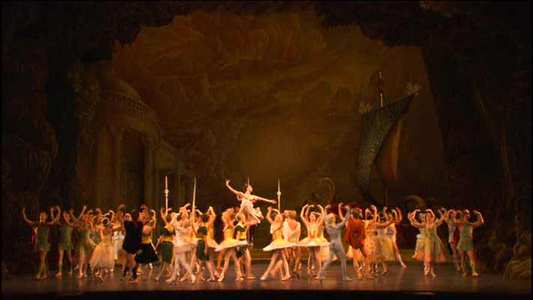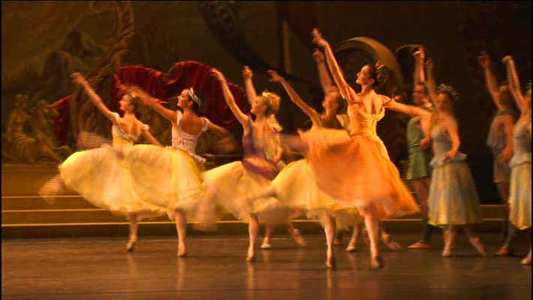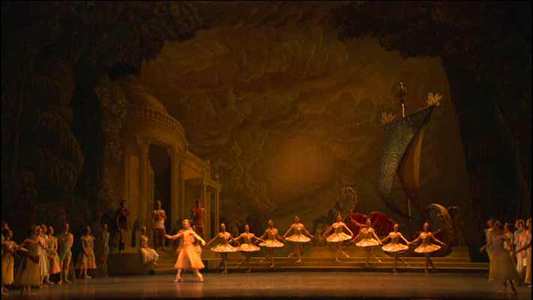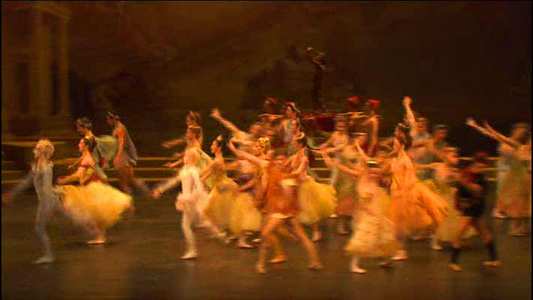Delibes: Sylvia
Introduction
Filmed over 2 nights in December 2005, this realisation of the nearly lost choreography by Frederick Ashton was broadcast on the BBC on Christmas Day of the same year, and represents one of Darcey Bussell`s final appearances as Principal of the Royal Ballet.
The slight, and arguably trite story, is based on the mythical tale of the warrior nymph, Sylvia, who has renounced love and therefore mocks the God of love, Eros. He, quite natually, lets off one of his arrows to spite her, hits her squarely in the midriff, and she falls in love with the shepherd, Aminta. A short spell of being kidnapped by the evil hunter Orion is followed by a `happy-ever-after` ending following Orion`s defeat by the Goddess, Diana.

Video
Being a recent TV recording, NTSC video quality is very good indeed, although there is some very mild `flickering` in the darker areas of the stage. The colours of the traditional, but excellent staging however are caught nicely.

Audio
The DTS sound is excellent, with a very good lower-end, giving a natural bloom to the orchestral textures, and the placement of microphones brings out any instrumental soloists clearly.

Features
Apart from the usual `Illustrated Synopsis` and Cast Gallery, the main extra is a set of optional `introductions` to each Act (and a conclusion) by Bussell herself which you can choose to play via the chapter menu options. These were also included in the Christmas Day broadcast, but complaints were made about the fact that the opening introduction was spoken over the overture, so it seems that this was taken into account here, as we are able to view the whole thing (mercifully) uninterrupted should we wish.
Bussell has a rather stilted and mannered tone to her speaking voice, and her pronunciation appears very odd indeed at times. The introductions also give the impression that she is trying very hard to show that ballet dancers are all human beings really, and not just the untouchable god-like creatures we see on stage, and so I felt that I was being talked to like a schoolchild. it`s nice to see a little of the backstage goings-on though, and rehearsal footage is always welcome.
The Act 3 introduction was far more informative, when Christopher Newton takes over. He worked with Frederick Ashton for years, and knew the choreography to Sylvia well. When Ashton began to have throughts about reviving the ballet three months before he died, Newton was the natural choice to continue his work, and judging by this performance he did a great job.

Conclusion
Darcey Bussell was 36 when this was recorded, and was soon to announce her partial retirement from dancing. Being the `big name` in British dance at the time, it was natural that it would be her performance as Sylvia that would be recorded for the TV broadcast (despite the fact that Zenaida Yanowsky was also getting rave reviews in the same role), and of course, she had appeared in `The Vicar of Dibley`, and so the recognition value would add to the ratings (although perhaps I`m being a little cynical here).
She certainly, to my eyes anyway, gives a very fine show, although I have seen more convincing acting in many other ballet DVDs, but has the personality and grace which draws your eyes to her when necessary. I wasn`t particularly convinced by the `pizzicati` characteristic dance though, purely because what I saw didn`t match the music exactly enough. The other principals however are never outshone, and the quite incredible physiques, poise, and sheer skill of Aminta (Roberto Bolle), Orion (a nicely evil Thiago Soares) and Eros (Martin Harvey) - who doesn`t appear to have much to do, but when he isn`t doing it, you can`t help but stare, deserve as much praise as Ms Bussell.
Perhaps I missed something, but the corps de ballet seemed to be on autopilot for much of the performance, with some ensemble work that didn`t seem quite as `together` as it should. Similarly, the orchestra sounded rather scrappy in places, with placed chords sounding frantic rather than tight, and some painful intonation in a few Act 1 woodwind chords (admittedly, it was probably a cold December night, and piccolos are notorious for misbehaving). Solos however are fantastic, with some great sounds from Melissa Forshaw (violin) and spot-on horn playing. Perhaps it`s easier to `slot in` two nights` recording for dance, but orchestral musicians never play the same way twice and so this may be why at other times the band sounded quite superb.
So, a typically classical `English` ballet, performed by the company for which it was written (choreography-wise anyway). I actually enjoyed it a lot, but often because of the very familiar, if rather twee, music, which was great to hear in its proper context as opposed to the more familiar chugging away at back desk of seconds in a muddy-field gig just before the 1812 fireworks extravanganza everyone has really come to see.
I hope that Opus-Arte`s recent `merging` with the Royal Opera House will produce many more of these live performances on DVD (and not necessarily the more recent stuff), as there is a huge legacy of more polished ballet performances which need to reach a wider audience, and will hopefully prove that there is more than one ballerina out there who is mworthy of public adoration.
Your Opinions and Comments
Be the first to post a comment!